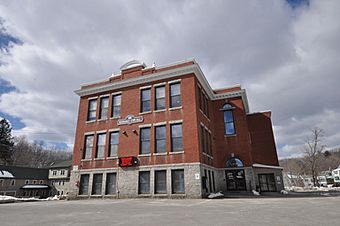Newmarket Industrial and Commercial Historic District facts for kids
Quick facts for kids |
|
|
Newmarket Industrial and Commercial Historic District
|
|

Newmarket Town Hall
|
|
| Location | NH 108, Newmarket, New Hampshire |
|---|---|
| Area | 10 acres (4.0 ha) |
| Architectural style | Greek Revival, Late Victorian, Federal |
| NRHP reference No. | 80000302 |
| Added to NRHP | December 1, 1980 |
The Newmarket Industrial and Commercial Historic District is a special area in Newmarket, New Hampshire. It shows what a busy mill town looked like in the 1800s. This district is unique because many of its old buildings are made of stone, which was unusual for mill towns back then. Even though the mills closed in 1920, much of the town's history is still well-preserved. This important district was added to the National Register of Historic Places in 1980. The Stone School, a very old building, is also part of this historic area.
Contents
Newmarket's Historic District
The town of Newmarket was officially created in 1737. At first, it was a busy place for shipping goods. This was because of the Lamprey River, which flows into the larger Piscataqua River.
A Town Built on Water Power
In the early 1800s, people started using the power of the Lamprey River. They built factories to make textiles, like cloth and fabric. These factories, called mills, helped the town grow a lot. The textile industry kept Newmarket busy until the early 1900s.
When the industry slowed down, it left behind many unique buildings. These buildings show the history of the Seacoast Region of New Hampshire.
Unique Stone Buildings
What makes Newmarket special is its use of stone. Many mill towns in southern New England built their factories and other buildings with brick. But in Newmarket, stone was used a lot.
You can see stone not just in the old mills, but also in houses, churches, and schools. The historic district has great examples of these stone buildings.
Exploring the District
The historic district stretches along Main Street, which is also New Hampshire Route 108. It goes between Gerry Street and Elm Street. Other streets like Exeter, Nichols, and Central are also part of it.
The main eastern edge of the district is the Lamprey River. The old mill buildings are lined up along the river. Across Main Street from the mills, you'll find the commercial buildings, like shops.
Residential houses are located on the smaller side streets. There's also a group of town buildings and a church where South Main Street meets Beech Street Extension. The town hall is a beautiful brick building. It was built in 1847 and shows the Greek Revival style of architecture.
 | Precious Adams |
 | Lauren Anderson |
 | Janet Collins |



